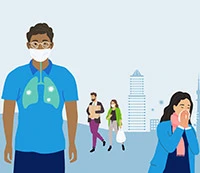Steps to help protect against COVID-19
Help protect yourself, your loved ones and your community from severe illness from COVID-19 by following these recommendations.
1. Stay Updated with COVID-19 Vaccinations
COVID-19 vaccines help protect you from getting seriously ill from COVID-19 by helping your body develop protection from the virus that causes COVID-19. Updated COVID-19 vaccines from Pfizer-BioNTech and Moderna are available for the 2024-25 fall and winter virus season for everyone 6 months and older. Updated COVID-19 vaccines from Novavax are available for everyone 12 years and older.
2. Wash Your Hands Often
Scrub with soap and water for at least 20 seconds. If you are unable to wash your hands, using hand sanitizer that contains at least 60% alcohol is a good alternative.
Avoid touching your eyes, nose and mouth—as it allows the germs on your hands to reach moist, porous surface tissue where the germs can enter your body and cause infection.
Cough and sneeze into a tissue, or elbow if necessary. Then immediately dispose of the tissue and wash your hands.
3. Improve Ventilation
Improving ventilation and filtration can decrease the number of virus particles indoors and help protect you from getting infected with COVID-19 since spread happens easier inside rather than outside.
4. Disinfect if You Have COVID-19
If someone is sick or has tested positive for COVID-19, then you should disinfect frequently touched surfaces, such as door handles, light switches, faucets and phones, often and with an approved disinfectant. If surfaces are dirty, first clean them using soap and water.
5. Stay Home if You Feel Unwell
Stay home and test for COVID-19 if you feel unwell. Seek treatment if you have COVID-19 and are at high-risk for severe disease.
6. Wear a Mask
Masks are a good way to help protect others when you have symptoms of COVID-19, received a positive COVID-19 test or were exposed to someone with COVID-19.
- People may choose to wear a mask at any time.
- Consider wearing a mask in indoor public spaces when your community has a lot of respiratory illness.
COVID-19 Vaccine Facts
COVID-19 vaccines are the best protection available against serious illness, hospitalization and death. Here are some more facts you should know:
- COVID-19 vaccines help our bodies develop immunity against the virus that causes COVID-19.
- COVID-19 vaccines cannot give you COVID-19.
- COVID-19 vaccines only protect you against the virus that causes COVID-19, not any other respiratory virus.
- It takes a couple weeks after vaccination for your body to build protection.
- Side effects after vaccination are common, mostly mild, and differ from person to person. This is a sign that your body is building immunity.
- You should get an updated COVID-19 vaccine regardless of past vaccination status and if you already had COVID-19.
- If you recently tested positive for COVID-19, you still should get an updated COVID-19 vaccine, but you can consider waiting 3 months after COVID-19 illness to get vaccinated.
- You can receive both your COVID-19 and flu vaccinations at the same visit.
- Getting a COVID-19 vaccine is a safer way to build immunity to COVID-19 than getting sick with the disease.
Reviewed and approved by the American Lung Association Scientific and Medical Editorial Review Panel.
Page last updated: February 12, 2025


